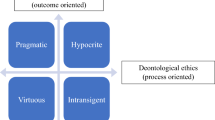Abstract
This article introduces a discussion on defining, measuring, and assessing the quality of democracy. Providing a short overview of the papers of the Symposium, it places them within a broader context of current academic debate on various methodological, theoretical, and policy outreach dimensions of the topic.
Similar content being viewed by others
Notes
‘At mid-century, there were 22 democracies accounting for 31 per cent of the world's population and a further 21 states with restricted democratic practices, for 11.9 per cent of the globe's population. By the close of our century liberal and electoral democracies clearly predominate, and have expanded significantly in the Third Wave, which has brought democracy to much of the post-Communist world and to Latin America and parts of Asia and Africa. Electoral democracies now represent 119 of the 192 existing countries and constitute 58.2 per cent of the world's population. At the same time liberal democracies – i.e. countries Freedom House regards as free and respectful of basic human rights and the rule of law – are 85 in number and represent 38 per cent of the global population’ (Freedom House Democracy's Century Report, 1999. Available online: http://www.freedomhouse.org/reports/century.pdf).
References
Altman, D. and Pérez-Liñán, A. (2002) ‘Assessing the quality of democracy: Freedom, competitiveness, and participation in eighteen Latin American countries’, Democratization 8 (2): 85–100.
Andreev, S.A. (2005) Conceptual Definitions and Measurement Indicators of the Quality of Democracy: An Overview. EUI Working Papers/RSCAS 2005/05, ISSN 1028-3625.
Beetham, D. (ed.) (1994) Defining and Measuring Democracy, Vol. 36, SAGE Modern Politics Series London: SAGE.
Beetham, D. (2005) ‘Freedom as the Foundation’, in L. Diamond and L. Morlino (eds.) Assessing the Quality of Democracy, Baltimore: The John Hopkins University Press, pp. 32–46.
Berg-Schlosser, D. (2006) ‘The Quality of Democracies in Europe as Measured by Current Indicators of Democratization and Good Governance’, in D. Hutcheson and E. Korosteleva (eds.) The Quality of Democracy in Post-Communist Europe, London/NY: Routledge, pp. 28–55.
Bobbio, N. (1988) O Futuro da Democracia, Lisboa: Publicações Dom Quixote.
Camp, R.A. (ed.) (2001) Citizen Views of Democracy in Latin America, Pittsburgh: University of Pittsburgh Press.
Coppedge, M. (2004) ‘Quality of Democracy and Its Measurement’, in G. O’Donnell, J.V. Cullell and O.M. Iazzetta (eds.) The Quality of Democracy: Theory and Applications, Notre Dame: University of Notre Dame Press, pp. 239–248.
Dahl, R. (1989) Democracy and its Critics, New Haven: Yale University Press.
Dalton, R.J., Shin, D.C. and Jou, W. (2007) ‘Understanding democracy: Data from unlikely places’, Journal of Democracy 18 (4): 142–156.
Diamond, L. and Morlino, L. (eds.) (2005) Assessing the Quality of Democracy, Baltimore: The John Hopkins University Press.
Geissel, B. (2008) ‘Migliorare la Qualità delle Democrazia a Livello Locale: Esperienze Innovative di Democrazia Partecipativa in Germania’, Rivista Italiana di Scienza Politica 38 (3): 365–391.
Landman, T. (ed.) (2008) Assessing the Quality of Democracy: An Overview of the International IDEA Framework, (with the contributions of David Beetham, Edzia Carvalho and Stuart Weir), Stockholm: IDEA – International Institute for Democracy and Electoral Assistance.
Levitsky, S. and Way, L. (2010) Competitive Authoritarianism, New York: Cambridge University Press.
Mény, Y. (1999) ‘Five (hypo)theses on democracy and its future’, Progressive Governance for the XXI Century, Conference Proceedings, 20–21 November 1999, Florence: EUI and NYU Law, pp. 111–126.
Morlino, L. (2006) ‘Good’ and ‘Bad’ Democracies: How to Conduct Research into the Quality of Democracy’, in D. Hutcheson and E. Korosteleva (eds.) The Quality of Democracy in Post-Communist Europe, London/NY: Routledge, pp. 5–27.
O’Donnell, G. (2010) Democracy, Agency, and the State: Theory with Comparative Intent, Oxford: Oxford University Press.
O’Donnell, G., Cullell, J.V. and Iazzetta, O.M. (eds.) (2004) The Quality of Democracy: Theory and Applications, Notre Dame: University of Notre Dame Press.
Plattner, M. (2005) ‘A Skeptical Perspective’, in L. Diamond and L. Morlino (eds.) Assessing the Quality of Democracy, Baltimore: The John Hopkins University Press, pp. 77–81.
Przeworski, A. (2010) Democracy and the Limits of Self-Government, New York: Cambridge University Press.
Ringen, S. (2007) What Democracy Is For? On Freedom and Moral Government, Princeton, NJ: Princeton University Press.
Schmitter, P.C. and Karl, T.L. (1991) ‘What democracy is… and is not’, Journal of Democracy 2 (3): 75–88.
Vanhanen, T. (1997) Prospects of Democracy: A Study of 172 Countries, London: Routledge.
Acknowledgements
A special word of gratitude goes out to Professor Alfred Tovias for his invaluable help in providing the information for this article.
Author information
Authors and Affiliations
Corresponding author
Rights and permissions
About this article
Cite this article
Pinto, A., C Magalhães, P. & Sousa, L. Is the Good Polity Attainable? – Measuring the Quality of Democracy. Eur Polit Sci 11, 447–455 (2012). https://doi.org/10.1057/eps.2011.45
Published:
Issue Date:
DOI: https://doi.org/10.1057/eps.2011.45




